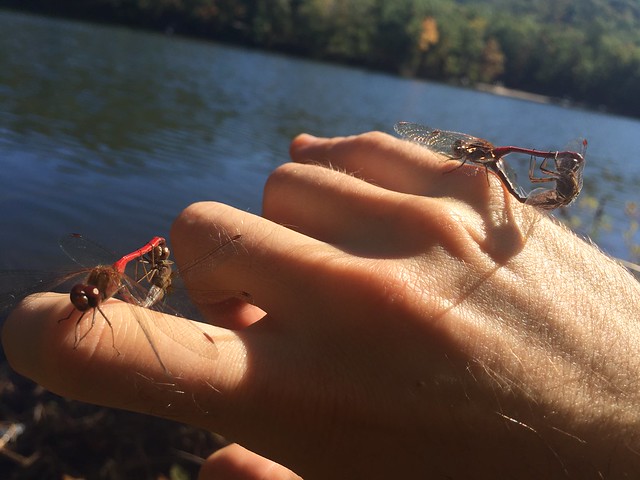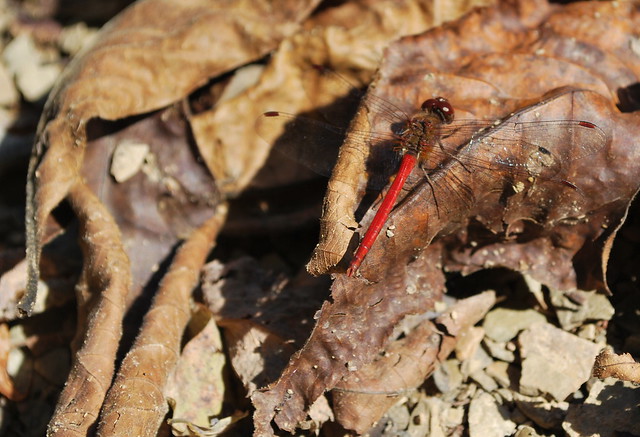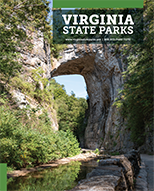Open fires are prohibited throughout the park from midnight to 4 p.m. through April 30 per the 4 p.m. Burning Law. This includes wood and charcoal. Gas is permissible. Campground fires are allowed during the restricted time if a camp host is on duty and signage to that effect is posted in the campground. Failure to observe the 4 p.m. Burning Law can result in a fine. Contact the Park Office for additional information.
Read Our Blogs
Dragonflies Dance at Douthat State Park
Sit by a lake, or anywhere in nature for that matter, and you never know what type of experience may occur. In quick moments wild reminders of the tenacity, intrigue, and diversity of our world happen around us.

Sometimes all you have to do is take the time to sit and nature happens
Sitting by the lake at Douthat State Park, I first noticed a few newts swimming under the surface and fish scurrying by, but a dragonfly soon caught my attention.
Then another pair.
They had one thing in mind: surviving and passing on their DNA to their offspring. And these Autumn Meadowhawks use teamwork towards a common goal.
A female dragonfly will sometimes deposit her eggs in the water, but she needs to keep her wings dry, so it can be a difficult task to hover without getting momentarily stuck in the water, where fish and newts and other things live.
Her mate, a male of the same species, holds her up and swings her, and together they accomplish the task. When they showcase this behavior they are said to be “in tandem.”
It was fascinating to watch the pair swinging and dipping. But then, as it warmed up, more and more Autumn Meadowhawks arrived. I was amazed, and I was lucky enough to record it on video.
Even though they are excellent fliers, these trapeze like moves are not an easy task and females occasionally get slung against a log. The trials and tribulations of depositing eggs, but dragonflies have been around since long, long before the dinosaurs so it’s a successful behavior and they continue to adorn and enhance ecosystems all around freshwater. The eggs will overwinter and hatch in early spring, when water temperatures rise.
I had a few unexpected surprises- two pair landed on my hand at one point. It was humbling and hypnotic looking into those ancient, primeval eyes up close.
Word must spread fast, this habitat exploded from a single pair to at least seven pair within a short amount of time.
Dragonflies begin their lives as larvae underwater, and only later in life after climbing out and undergoing metamorphosis do they have their strong wings and fly.

Male Autumn Meadowhawk sunning
As nymphs (during their underwater stage) they eat the larvae of mosquitos and flies amongst other things. As adults they eat the flying adult mosquitos. As predators they keep mosquito populations in check, and as prey they are food for fish and other animals as well.
Some dragonflies will eat tadpoles as nymphs and be swallowed by frogs as adults. Or eat fish fry as nymphs but eaten by a bass as an adult. Nature is complicated and dynamic this way, one species sometimes a predator, sometimes prey. A fine-tuned balance is established, and with it stability and a healthy ecosystem are produced. Strands that grow and connect out unto a giant thriving web of life that keeps us alive. And we are part of this web. We are a part of nature, not apart from nature.
And with depositing these eggs, another generation will be born and continue their species onward as the circle of life makes another loop around the track of survival. As it has for eons. And with protected and wild places kept intact, many populations such as this one keep on keeping on. This is but part of one species' story and these woods and our Commonwealth are brimming with life.
If you have read the article and have a question, please email nancy.heltman@dcr.virginia.gov.
Search for blogs
By Park
Categories
Cabins
Camping
Fishing
History and Culture
Other
Programs and Events
Trails
Volunteers
Water Fun
Archive
2024
2023
2022
2021
2020
2019
2018
2017
2016
2015
2014
2012














